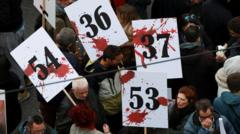In a powerful display of unity and demand for justice, Greeks across the nation have organized their largest protests in years, coinciding with a general strike to commemorate the tragic train disaster that claimed 57 lives two years ago. "I am here in memory of the people who were killed in the train crash. We demand justice," stated 13-year-old Dimitris, who participated in a significant demonstration in Syntagma Square, Athens, alongside his father.
The disaster occurred on the night of February 28, 2023, when a packed passenger train collided with a cargo train in central Greece. An investigation revealed that the incident was a result of human error, inadequate staffing, and poor maintenance. Christos Papadimitriou, the head of Greece's Air and Rail Accident Investigation Authority, emphasized the safety failures that remain unaddressed, declaring, "Those children were killed because the train was not safe."
The Tempi disaster ignited outrage among the public, as many accuse the conservative government of insufficient transparency regarding the causes of the tragedy, fueling speculation about potential cover-ups involving senior officials. The demonstration saw participants of all ages, many rallying for the first time, expressing solidarity and mourning for the victims.
As the event progressed, tensions escalated when clashes erupted between police and protesters. Some protesters threw petrol bombs, drawing a heavy response from law enforcement, including the use of tear gas. Many attendees wore shirts that carried poignant messages, reflecting their grief and demand for justice.
Protests were not limited to Athens; additional rallies took place in 346 cities throughout Greece, with gatherings also reported in major European cities such as Brussels, Rome, and London. Participants carried signs with emotional messages, including “My child, call me up when you arrive” and “No cover-up.”
Dina Gazi, a 62-year-old participant, held balloons inscribed with the names of those who perished in the crash, declaring, "I firmly believe that the government is covering up those responsible for the accident." Retail outlets in the vicinity closed their doors in solidarity, as many sympathized with the cause, causing disruptions in various sectors such as public transport, education, and air travel.
Prime Minister Kyriakos Mitsotakis recognized the somber occasion, expressing condolences for the victims and their families on social media. He acknowledged the "fatal human errors coupled with chronic shortcomings of the state," an admission that places unprecedented pressure on the administration as it faces demands for rapid reform in train safety and infrastructure.
This movement stands out in Greece, as it primarily reflects discontent around the state’s accountability, rather than economic concerns. Investigations revealed millions allocated for enhancing safety measures were stalled, exacerbated by corruption and bureaucratic delays.
The families of crash victims believe there may be more to the narrative, suggesting the cargo train was involved in smuggling operations. Ongoing public anger is further heightened by claims that vital evidence was lost following the mishandling of the crash site.
Despite allegations of a cover-up, government spokesperson Pavlos Marinakis firmly denied such claims, asserting there is no substantial evidence for a political directive to interfere with the investigation. Among the mourners, Pavlos Aslanidis poignantly shared his grief over the loss of his son in the tragedy, highlighting the unwavering resolve of families demanding justice for their loved ones.


















